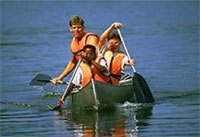Difference between revisions of "Canoeing and Kayaking"
From AuxBWiki
Brucejohnson (Talk | contribs) (→External Links) |
Brucejohnson (Talk | contribs) (→External Links) |
||
| Line 25: | Line 25: | ||
===Training Resources=== | ===Training Resources=== | ||
* [http://www.division22.org/private/Aux-BSA/A_SmartStart_for_Paddlers.ppt A SmartStart for Paddlers (4.7 meg Powerpoint)] | * [http://www.division22.org/private/Aux-BSA/A_SmartStart_for_Paddlers.ppt A SmartStart for Paddlers (4.7 meg Powerpoint)] | ||
| − | |||
| − | |||
| − | |||
| − | |||
===Contributed by=== | ===Contributed by=== | ||
[mailto:[email protected] Alex Cascione], BC-VQS | [mailto:[email protected] Alex Cascione], BC-VQS | ||
Revision as of 11:49, 27 December 2009
| Canoeing and Kayaking are on-the-water activities participated in by Boy Scouts, Sea Scouts, and Venturers, who are members of the Boy Scouts of America (BSA). It provides effective youth training in character, citizenship, and mental and personal fitness. Boy Scouts are expected to develop personal religious values, learn the principles of American heritage and government, and acquire skills to become successful adults. To achieve these, Boy Scouting applies eight methods of Scouting: Ideals (viz., the Scout Oath, the Scout Law, the Scout Motto, and the Scout Slogan), the patrol method, participation in outdoor programs, advancement, adult association, personal growth, leadership development, and the uniform. Boy Scouting is generally available to boys between the ages of eleven and seventeen. They are organized in Scout troops, administered by volunteers with support of paid professional staff. Youth and adult members are Scouts, the boys are referred to as Boy Scouts, and the adults as Scouters. |
Scout Resources
Advancement Resources
- Able Sea Scout, requirement 17(i)
- Canoeing Merit Badge
- Kayaking BSA
- Whitewater Merit Badge
External Links
Magazines
Training Resources
Contributed by
Alex Cascione, BC-VQS
